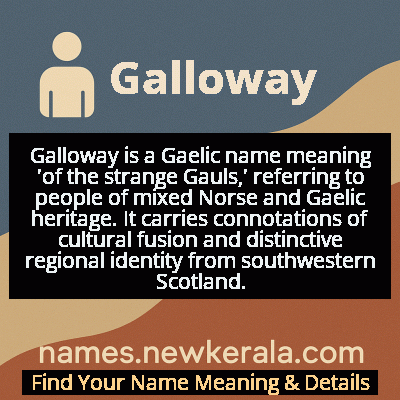Galloway Name Meaning & Details
Origin, Popularity, Numerology Analysis & Name Meaning of Galloway
Discover the origin, meaning, and cultural significance of the name GALLOWAY. Delve into its historical roots and explore the lasting impact it has had on communities and traditions.
Name
Galloway
Gender
Male
Origin
Gaelic
Lucky Number
6
Meaning of the Name - Galloway
Galloway is a Gaelic name meaning 'of the strange Gauls,' referring to people of mixed Norse and Gaelic heritage. It carries connotations of cultural fusion and distinctive regional identity from southwestern Scotland.
Galloway - Complete Numerology Analysis
Your Numerology Number
Based on Pythagorean Numerology System
Ruling Planet
Venus
Positive Nature
Harmonious, responsible, caring, and artistic.
Negative Traits
Overly idealistic, superficial, possessive, or jealous.
Lucky Colours
Pink, turquoise.
Lucky Days
Friday.
Lucky Stones
Diamond, turquoise.
Harmony Numbers
2, 3, 9.
Best Suited Professions
Artists, musicians, teachers, healthcare workers.
What People Like About You
Warmth, nurturing nature, artistic flair.
Famous People Named Galloway
Alexander Galloway
Scottish theologian
Prominent Covenanting minister and religious leader during the Scottish Reformation
James Galloway
American pioneer
Early settler and community founder in Ohio, instrumental in frontier development
William Galloway
Engineer and inventor
Developed important improvements in steam engine technology and industrial machinery
Robert Galloway
Professional tennis player
American doubles specialist with multiple ATP Challenger titles
Name Variations & International Equivalents
Click on blue names to explore their detailed meanings. Gray names with will be available soon.
Cultural & Historical Significance
Historically, Galloway was a semi-independent lordship that maintained its own laws and customs, often resisting central authority from both Scottish and English monarchs. This independent spirit became embedded in the regional identity and subsequently in the surname that emerged from the territory. The name carries echoes of Scotland's turbulent medieval history, representing a people who maintained their distinct cultural identity despite political pressures from surrounding kingdoms. The cultural significance extends beyond Scotland through diaspora communities, particularly in North America and Australia, where the name continues to symbolize Scottish heritage and regional pride.
Extended Personality Analysis
Individuals bearing the name Galloway are often perceived as possessing a strong sense of independence and resilience, reflecting the historical character of the Galloway region that maintained its autonomy against larger powers. They tend to be practical, grounded people with a deep connection to tradition and heritage, yet adaptable to changing circumstances—much like their ancestors who blended multiple cultural influences. Galloways are typically seen as determined and persistent, capable of weathering challenges with quiet strength rather than flashy displays.
There's often an undercurrent of mystery or depth to their character, perhaps echoing the 'strange' or 'foreign' element in the name's meaning. They value authenticity and tend to be straightforward in their dealings, preferring substance over superficiality. While they may appear reserved initially, they form deep, loyal connections with those they trust, mirroring the close-knit communities of their ancestral homeland. Their personality often combines traditional values with innovative thinking, making them both reliable and surprisingly creative problem-solvers when faced with complex situations.
Modern Usage & Popularity
In contemporary times, Galloway remains primarily a surname but has seen occasional use as a first name, particularly in Scotland and among Scottish diaspora communities. As a first name, it carries a distinctive, heritage-rich quality that appeals to parents seeking names with historical depth and regional significance. The name maintains moderate popularity in Scotland and has seen a slight resurgence as part of the broader trend toward using surnames as first names. In North America, it's more commonly encountered as a surname but occasionally appears as a masculine given name, often chosen by families with Scottish ancestry or those attracted to its strong, geographical connotations. Its usage remains relatively uncommon, preserving its distinctive character while avoiding over-popularization that might dilute its cultural resonance.
Symbolic & Spiritual Meanings
Symbolically, Galloway represents cultural fusion and resilience—the ability to maintain identity while adapting to external influences. The 'strange Gauls' etymology suggests someone who bridges different worlds or perspectives, embodying the wisdom that comes from understanding multiple cultures. It symbolizes rootedness in tradition coupled with the capacity for transformation, much like the Galloway region itself which maintained distinct cultural practices while incorporating new influences. The name also carries connotations of strength and endurance, reflecting the rugged landscape of southwestern Scotland from which it originates. There's an element of mystery and depth suggested by the 'strange' component, indicating someone with hidden depths or unconventional perspectives. Ultimately, it represents the enduring power of regional identity and the strength found in cultural diversity, serving as a reminder that what makes us different can also be our greatest strength.

